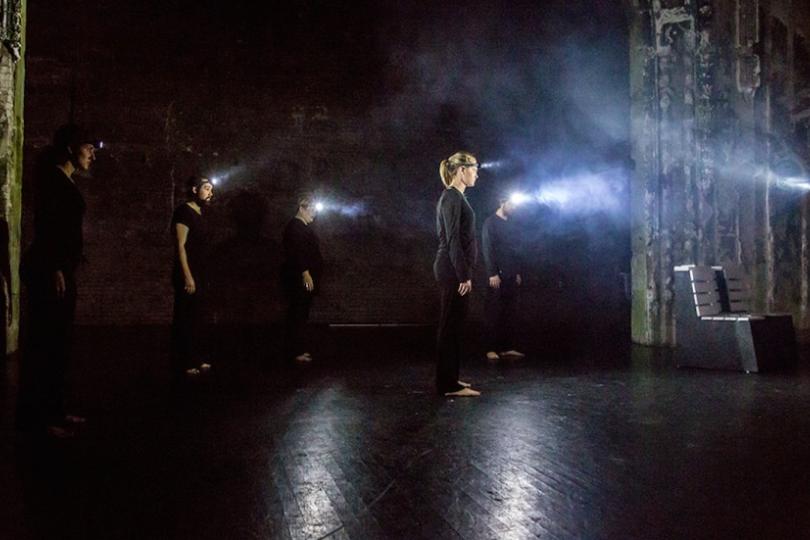Blood and mayhem

Ever since I started writing about the Twin Cities Horror Festival three years ago, people have been asking me what it’s like. I understand the curiosity. After all, the concept of horror theater is fairly foreign to a lot of casual observers, let alone a 10-day festival dedicated to nothing but.
I have to admit, I don’t have a very good answer as to what it’s like, and that’s exactly why I like it so much. Obviously any festival is going to cover a range of styles, but the TCHF umbrella makes the wide range of approaches all the more evident. Simply put, there are a lot of ways to look at horror. Here are a few of the lenses we’re looking through this year.
Horror in the blood
Sometimes theatrical horror comes bloody and stomach-churning to a degree you might not think possible on a small stage with a small budget. The goriest entry in this year’s roster, Dangerous Productions’ Epidemic follows a mysterious outbreak that causes members of a research team in a secure facility to literally tear themselves apart. Throats are slashed, flesh is shredded and body parts are chewed off with disturbing verisimilitude.
Easy as it would be to coast on sheer viscera, Tyler Olsen’s show creates a self-contained world peopled with distinctive characters who give us reason to care about them before they meet their messy demises. As evinced by so many Fringe shows, that’s not an easy thing to achieve in a 60-minute, multi-character play.
Add some clever set design to the mix - the quarantined building is represented by a taped-off tarp on the stage, with characters moving from floor to floor by running around the perimeter - and this is a stirring, startling production that’s much more than mere shock theater.
Horror in the brain
Ghoulish Delights’ The Thermos Bottle features far fewer body fluids and a far lower body count than Epidemic, but the two plays share some themes of isolationism and a knack for chilling imagery. The core of the story takes place on a remote island research center, where a quasi-governmental scientific cabal is holding an entity from... elsewhere.
The nature of the being (Kirsten Stephens in a truly unnerving display of physicality) is revealed bit by bit as seemingly unrelated vignettes play out in other corners of the stage: a man with an unidentifiable ailment visits a new age healer, two siblings reconnect after the death of their parents, a young couple tiptoes around a budding romance, a pair of spiritual mediums bicker over protocol.
The real pleasure of Tim Uren’s production isn’t in how deftly all of these stories come together - although that is impressive - but in how effectively those resolutions capture deeper concepts of human connection and the fragility of life.
Horror in comedy
Speaking of sneakily insightful work, that’s become a trademark of Four Humors productions. Mortem Campiendum begins as a very funny spin on a Depression-era medicine show, with Matt Spring’s ineffective pitchman heaping indignities on Brant Miller’s good-natured second banana and applying miracle cures to audience plant Jason Ballweber.
All of this is heartily entertaining on its own, but when the trio’s signature snake oil is revealed to be the cure for death itself, more and more intriguing cracks begin to spread through the narrative. Roles are reversed, strained metaphors become disturbingly apt and the lines between truth and lie disintegrate. The laughs never stop, and in fact barely ever slow down, but over the course of the show the tone of that laughter shifts almost imperceptibly from raucous to rueful. The end result is as chilling as anything in the festival, albeit in a very different way.
Horror in movement
Movement-based horror has been a staple at the movie theaters for ages, but there’s something extra unsettling about seeing those movements unfold live on stage without the benefit of Hollywood effects. While Green T Productions’ Kaidan is rooted in classic Japanese folk tales, the actions speak louder than the words. Long-haired, faceless ghosts converge silently on a traveler. A corpse spins and writhes like a breakdancer possessed. A beautiful specter vaults her suitor with gymnastic grace. A massive, shapeless demon lumbers out of the shadows to feed. If the storytelling seems an afterthought, it’s mainly because the imagery is so indelible.
Not quite a dance piece, not quite a traditional narrative, Kaidan is all the better for its hybridization. (It’s also the rare TCHF production centered on non-white performers, another welcome distinction.)
Movement is less of a focus in Oncoming Productions’ The Deep Dark, but it’s again where the play makes itself most felt. As a fairly straightforward story of two shipwreck survivors drawn back to the scene of their greatest trauma, it’s a well-done production that nevertheless feels a bit familiar.
The Deep Dark really comes to life, though, when the action moves underwater. Director Sean Dillon makes great use of bodies, employing his cast as rising bubbles, swirling whirlpools and schools of fish. Coupled with the show’s eerie, aquatic sound design, these undersea sequences stand out as nightmarish interludes that buoy the rest of the show.
Horror in music
And of course it wouldn’t be a horror festival without something fucked-up for fucked-uppednesses’ sake. This year we’re treated to The Coldharts’ The Unrepentant Necrophile, which is pretty much just what it sounds like, except it’s also a rock opera.
While the Brooklyn-based trio’s opening performance was beset by a number of technical difficulties, some of them seemingly inherent to performing a three-person rock opera in which one of the characters is a drum-playing corpse, the gleeful crassness of the whole proceeding is hard to resist. The musical staging is endlessly inventive, Katie Hartman’s voice is a remarkable instrument and the songs are pretty great even beyond the context of the play.
And heck, you get to tell your friends you just saw a rock musical about a backwoods necrophiliac love triangle. For horror buffs, that kind of claim is well worth the price of a ticket.




